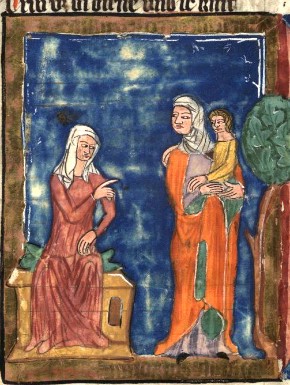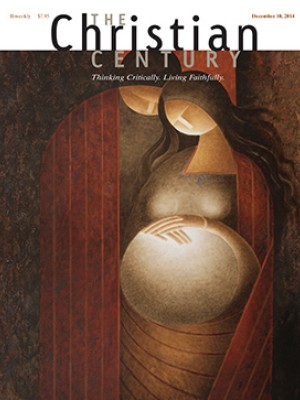The other woman
Hagar’s story has often been read as if it explains some inevitable animosity among the Abrahamic faiths. We should try reading it differently.

The Bible is not good propaganda. This is one of the things I like best about it.
Its heroes often lie, steal, and drink too much. Institutions are established and then undermined by counternarratives that expose their corruption. Seeds for the undoing of the official narratives are always being planted. Stories are told and then revised; the people of God are condemned and redeemed. The Bible is not a slick promotional tool for a nation or an institution or even a particular set of beliefs as much as it is a witness to a God who is profoundly alive—and always a little outside the sphere of what we know. This is a beautiful thing about monotheism: it eschews idolatry in favor of a lover who resists calculation, a lover who knows no bounds.
Of course, this hasn’t kept us from using the Bible to enforce boundaries, support prejudice, fuel hatred, and promote one nation over another. The story of Hagar and Ishmael has often been read as if it explains some inevitable animosity among the Abrahamic faiths. We should try reading it differently.
Read our latest issue or browse back issues.
A September survey by the Pew Research Center finds that an increasing share of the public—including seven out of ten white evangelicals—believes that Islam is more likely than other religions to encourage violence among its believers. This may be partly a result of what makes the news. We can’t escape ISIS coverage, but I had to work to find news about the hajj, the October event in which more than 2 million diverse Muslims made their peaceful pilgrimage to Mecca—and Islamic leaders spoke against extremism and in favor of nonviolence.
But it may also have something to do with how we tell our stories. While Hagar has been an important figure in the African-American church, she doesn’t usually get loads of positive attention in Christianity. The way I heard it in Sunday school, Abraham’s relationship with Hagar is a mistake. She is sultry and sinister—the archetypal other woman. Isaac, Abe’s son with his wife Sarah, is sweet and compliant. But Hagar’s son Ishmael is gruff and wary, a bully with something suspect up his sleeve. I can’t say exactly how this was conveyed back then, but I’ve seen recent curriculum that is quite pointed: Ishmael mocks his half brother, thus deserving to be banished by God to the desert. This reading depends on one word, m’tzahek, which can be translated many ways.
The text is really anything but clear on the moral qualities of the characters involved. This doesn’t seem to be the point. What is clear is that the Bible gives Hagar a remarkable story. She takes over for two different major passages in Genesis—fairly long, detailed narratives that disrupt the larger patriarchal plot lines. Sarah can’t get pregnant. She’s well past the age for bearing children. She knows there needs to be an heir, so she tells Abraham to have sex with her Egyptian maid, Hagar. Hagar gets pregnant.
Sarah should be happy, but she isn’t. Some translations say that once Hagar gets pregnant, she looks at Sarah with “contempt.” But the Hebrew is actually much softer than that, something more along the lines of “with less esteem.” This could be because Sarah has forced her to have sex with Sarah’s 85-year-old husband. Or maybe it’s because Sarah is asking her to bear a child she will have to give away. In any case, Sarah tells Abraham she doesn’t like the way Hagar looked at her. This might indicate that Hagar has done something significant enough to irritate Sarah, but it’s hardly evidence that she is arrogant or cruel.
After Hagar flees Sarah’s harsh treatment, an angel finds her in the desert and tells her to go back to camp, because “Behold, you shall bear a son and you shall call him Ishmael.” This is not the only time we hear such a line in the Bible, but it is the first—the first annunciation. The angel gives Hagar the same promise God gave Abraham: “I will greatly multiply your descendants that they cannot be numbered for the multitude.”
Then Hagar, this woman, gives God a name. She’s the first person in the Bible to call God by name. She calls God “The God Who Sees”—a beautiful name and a significant moment for monotheism. Unlike other deities that are distant and unapproachable, the God of Abraham and Hagar draws near, pays attention, seeks relationship with the outcast.
The angel says Ishmael will be “a wild ass of a man.” This may sound insulting, but in the Bible the wild ass is, perhaps most significantly, free (see Job 39:5). Hagar’s name means other or stranger. She’s an outlier, an Egyptian, and though Sarah deals with her harshly, God is tender with her. God watches over her, intervenes for her protection.
Hagar returns to camp. But later, when Sarah’s son is born, Sarah casts her out again—determined that “the slave woman’s son” will not share in Isaac’s inheritance. This turns into a heart-wrenching scene. Abraham doesn’t want to send them away. He puts Ishmael on Hagar’s back and gives her a little water and bread. When the water is gone, Hagar puts her dying boy under a bush and sits down. She pleads, “Don’t make me watch my son die.” She is the first person in the Bible to weep.
God responds quickly. God tells Hagar not to be afraid, to “lift up the lad and hold him fast with your hand for I will make of him a great nation.”
Hagar’s story parallels Abraham’s to a stunning degree. She takes the first son into the wilderness, where his death seems imminent until an angel speaks and shows her a well. Abe takes the second son up to Mount Moriah, where his death seems imminent until an angel speaks and shows him a ram. The two stories include parallel language, sometimes using the exact same words. Abe is the central character in the Isaac story. Hagar is the central character in the Ishmael story. It’s almost like a matriarch on par with the patriarch!
No matter how the dominant narrative is inclined, the Hagar story is planted in the middle of it—just the sort of unsettling seed our nonpropagandistic scripture is forever planting. You’d think it might blossom into something creative, sustaining, and redeeming, but it doesn’t exactly play out that way. From Isaac come the Jewish people, from Ishmael comes Islam—so the story goes, and Hagar’s narrative is read as if it prophesies tanks and bombs and perpetual strife. There are other possibilities.
There aren’t many more stories about Hagar in the Hebrew scripture, and most Christians don’t think to regard her. But there are vital stories about her in the Islamic tradition. In Islam, Hagar is the matriarch of monotheism. It is through Ishmael that Muhammad comes. God leads Hagar into the wilderness so that through her a new faith might be born.
These Islamic stories are similar to the ones in the Hebrew scripture. Hagar and Ishmael are sent to the wilderness, where they run out of water. In a total panic Hagar starts running back and forth between two hills, desperately looking for water. After his mom’s seventh run, Ishmael kicks the ground with his heel and causes a miraculous well to spring out of the ground. It’s called the Zamzam well, and Muslims visit it when they make their pilgrimage to Mecca. It’s part of their pilgrimage to reenact Hagar’s grief by running seven times between the hills. Then they drink from the Zamzam, and they take some of the water back home in memory of Hagar.
The Kaaba, at Mecca, is the holiest shrine in Islam. According to tradition, it was built by Adam and then rebuilt later by Abraham and Ishmael, when Abraham came to visit his son. While in the Hebrew scripture Abraham seems to abandon Ishmael, in the Islamic stories he keeps coming to visit. There’s something heartbreaking and beautiful about these stories. One son in one place, one in the other—Abe trudging back and forth, the father of not one faith but two. Abraham loves both of his sons.
The tension created by these different narratives hasn’t always turned out to be creative. But couldn’t it be? Trying to simplify the story is not just less interesting; it’s also dangerous. We need to listen for the repressed narrative—not because it’s clever to read this way, but because the life of the world depends on it. If scripture hardens our hearts against anyone, I’m pretty sure we’re reading it wrong.
Here’s an odd biblical detail I like, a beautiful undermining of the grand narrative. When Joseph—an important figure in the official Hebrew story—is abandoned in the wilderness by his family, he is saved by a passing caravan of Ishmaelites. This detail doesn’t really fit at the level of historical narrative. There’s no way the descendants of Ishmael could appear so soon as an established group; Ishmael himself is just two generations past, the half-brother of Joseph’s grandfather. It seems instead like a lovely little plant in the story: a caravan of Ishmaelites saves a Hebrew patriarch.
And then there’s this. Near the end of Abraham’s life, after Sarah has died, he marries Keturah. According to Midrashic tradition, “Keturah” is actually Hagar’s real name—“Hagar,” the “other,” is just a description. So Abraham doesn’t cut off the counternarrative. He embraces it, takes it into his heart. He lies in bed with it—makes love with Hagar again, and they have many more children.
In this reading, the world is not hopelessly divided. It isn’t one side or the other. Hagar and Abraham embrace in their old age. Boundaries are blurred, and God’s love is let loose. May this somehow be so.
Portions of this article are adapted from an essay that appears in Disquiet Time: Rants and Reflections on the Good Book by the Skeptical, the Faithful, and a Few Scoundrels, edited by Jennifer Grant and Cathleen Falsani.





